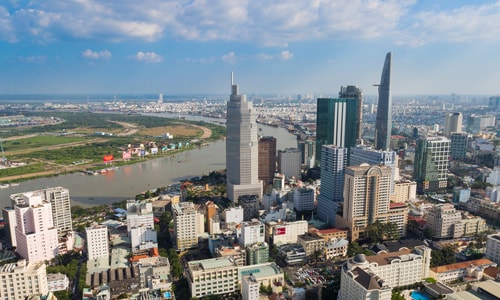Foreign tycoons flock to Vietnam real estate
Many large foreign corporations have stepped up their strategy to penetrate the Vietnamese housing market, through forming joint ventures or purchasing shares of domestic enterprises.
Ho Chi Minh City and Hanoi are two locations that have received special attention from Asian investors (Japan, Korea, Singapore) in the past 9 months, but coastal projects have also been targeted.
In the third quarter of 2016, the real estate market in Ho Chi Minh City recorded the formation of the Maeda Joint Venture (a company from Japan) and Thien Duc Company to develop the Waterina project in District 2. Maeda is the contractor for the underground section in District 1, Ho Chi Minh City of the Ben Thanh - Suoi Tien Metro Line. With the housing development channel, Waterina is the first luxury apartment project of Maeda Group in the Vietnamese market.
According to a real estate survey consultancy in Ho Chi Minh City, this foreign investor spent many years researching the Vietnamese real estate market before officially entering the luxury apartment segment.
Similarly, Mitsubishi Corporation signed with Bitexco to establish a joint venture to develop a housing project with a total initial investment of 290 million USD. Another giant is Kajima - a 176-year-old construction corporation from Japan, which has just launched a joint venture with Indochina Capital with a total investment of 1 billion USD in the next 10 years. The capital contribution ratio of the Kajima - Indochina Capital joint venture (ICC-Kajima) is revealed to be 50-50 for each side.
In the next 12-15 months, the joint venture will launch four luxury real estate projects in Ho Chi Minh City, Hanoi and Da Nang. Indochina Capital revealed that the four projects to be announced have been screened by the two partners from a list of 50 potential projects in the Vietnamese market. Initially, the new joint venture will focus on luxury real estate projects in the form of resorts, serviced apartments, hotels and houses.
"Vietnam has always been a key market for us. The joint venture aims to create real estate with outstanding value for investors and customers in this market," said Keisuke Koshijima, Director of Overseas Market Development of Kajima Corporation.
 |
Many large foreign corporations and companies are pouring capital into the Vietnamese real estate market. Photo: Vu Le |
In the private equity investment channel, Frasers Centrepoint Limited Investment Fund (Singapore) bought 70% of shares in the G Homes Project from An Duong Thao Dien Group. Mirae Asset Securities Company (Korea) has just cooperated with AON BNG Group to spend 350 million USD to acquire Keangnam Hanoi Landmark Tower.
In addition, in the past 9 months, big names such as Lotte and Mapletre have also announced strong capital injections into famous real estate projects in the East of Ho Chi Minh City. Recently, the market has recorded another huge transaction from individual investors. A foreign billionaire spent 15 million USD (equivalent to 330 billion VND) on a beach villa in Da Nang.
During the Ho Chi Minh City real estate market report held at the end of September, CEO of CBRE Vietnam - Marc Townsend received a series of questions about the wave of FDI investment in Vietnam.
Mr. Marc Townsend confirmed that the interest of foreign investors in the real estate market of Ho Chi Minh City, Hanoi and coastal provinces is very large. The appetite of these investors is to seek opportunities to develop housing projects with good connections to the city center or assets that are already in operation and can bring in stable cash flow.
However, this expert said that most foreign investors do not make quick decisions but spend a lot of time learning and researching the market thoroughly, then make specific moves.
According to CBRE, in the past 9 months, Vietnam attracted 16.4 billion USD of newly registered FDI capital and increased from 1,820 projects. Of this, 6% of capital flowed into real estate business activities. The current reaction of foreign investors to the Vietnamese market is quite positive.
The increasingly strong wave of foreign investment in Vietnam's real estate sector is explained by two reasons. Jones Lang LaSalle assessed that the attractiveness to foreign investors is primarily due to the market's basic indicators. These are rapid urbanization, young population, expected steady income growth, stable economy and deep integration, and an increasingly large middle class... In addition, efforts to improve the transparency index of the real estate industry also play an important role in attracting foreign investment.
According to the 2016 GRETI report by Jones Lang LaSalle, Vietnam is ranked quite low in terms of transparency in the real estate market (ranked 68 out of 109 countries). However, compared to previous years, Vietnam's image is improving year by year.
Currently, foreign investors can easily access market information and the legal framework gradually forces participants to comply with transparent processes. Domestic project developers have also made great strides in applying powerful technology. These are three typical factors that improve transparency for Vietnamese real estate. According to this unit, the transparency index has contributed significantly to improving the investment environment for Vietnamese real estate in the eyes of foreign investors.
According to VNE

